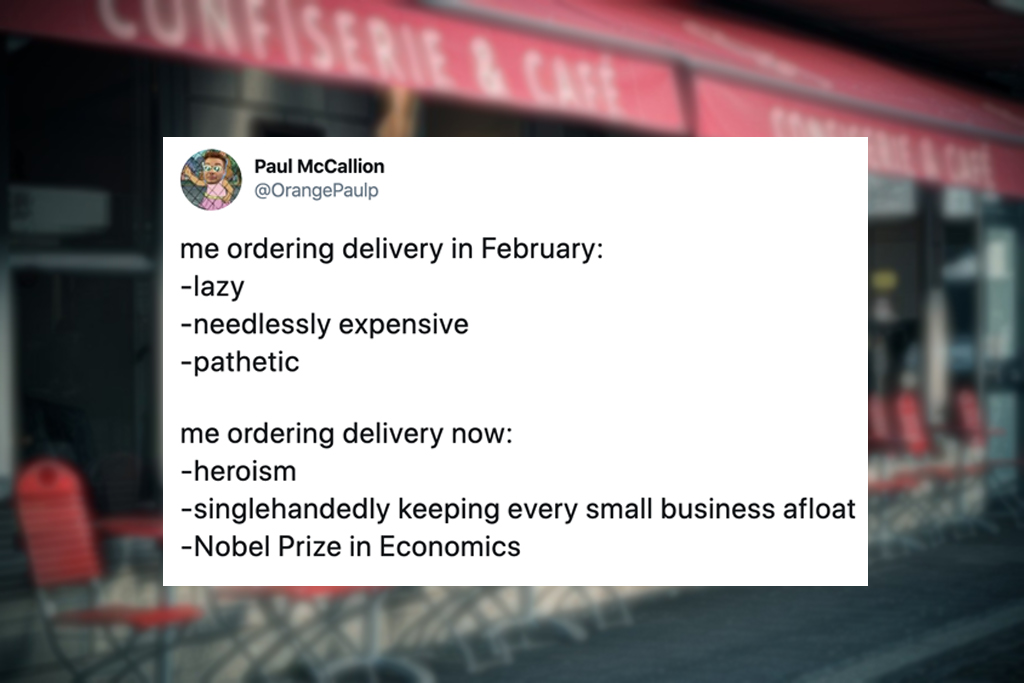Why You Shouldn’t Feel Bad If You Can’t Afford To Support Small Businesses During A Crisis
Never apologise for being skint.

In the age of corona, wanting to support the small businesses around you is a common feeling amongst young adults.
From the beloved pubs that quickly became your weekend local to the cafes with the nice old lady who always remembers your coffee order, we are innately drawn to what we’ve always known. But with the shutdown of non-essential businesses at the hands of COVID-19, heaps of people have been left in less than ideal situations and as humans we can only help so many at once.
Just like these affected businesses, a lot of us have also been negatively impacted by coronavirus. We’ve seen mass redundancies and pay cuts put in place in response to the pandemic, and yet, we all have the feeling that we need to be supporting the little businesses more than ever before.
me ordering delivery in February:
-lazy
-needlessly expensive
-patheticme ordering delivery now:
-heroism
-singlehandedly keeping every small business afloat
-Nobel Prize in Economics— Paul McCallion (@OrangePaulp) March 19, 2020
In this week’s Frugal Forever podcast episode, hosts Katie Cunningham and Josie Parsons talk all about the current dilemma of wanting to support small business in the age of COVID-19 when you’re skint yourself. With the help of Beth Wicks, owner of the small business, Swop, the girls try to figure out the right way to balance supporting yourself and the businesses that you love.
While we would all love for life to return to normal post-coronavirus, it’s likely that some businesses won’t be able to make it through. And that’s ok, we’re all adjusting to a new normal where we don’t have as many monetary freedoms we once had. Not everyone will be able to spend as frivolously as before, and as a result, small business will lose some trade.
Ultimately, you shouldn’t feel like you have to support small business if you can’t afford to do so — that should fall under the governments responsibility. Even for those with full-time jobs, there’s no saying that your employer won’t turn around tomorrow and say, “sorry, we can no longer employ you.”
Basically, how you use your money is your choice. “You shouldn’t have to have that all on your shoulders,” Josie explains. “You can do what you can within the parameters of what you can do, and the rest? Hopefully the government would pick up.”
And with the support packages in place, this is what the government is attempting to do, albeit not very well according to Beth Wicks who finds the bail out instructions super confusing. After talking with her accountant, Beth realised that the support packages actually required her to pay her staff out of pocket, to the sum of $80,000, until the government reimbursement comes through — something that was not explained to small businesses when the support was announced.
Govt: Just follow the information. Don’t panic.
Also govt: All info will be given at 10pm in the form of angry riddles, tune in to see if you have a job tomorrow bitch
— Meg Watson (@msmegwatson) March 24, 2020
Generally speaking, while wanting to support these struggling small businesses is a good idea, Josie highlights that small business doesn’t just mean the mom-and-pop shops down the road. Franchises are often overlooked as deserving recipients of community support because of the big name attached to them.
This is a real life issue for Katie, who is currently having a moral dilemma over deciding whether to continue supporting her local F45 branch through livestreamed classes. While the branch is offering the virtual classes for half of what the weekly rate normally is, it’s still a steep $35/week for content when similar workouts are available elsewhere for free.
But as small businesses try to adapt and cater to their loyal customers, big business are simply capitalising wherever they can. Yep, the disaster capitalism that we saw in designer face masks during last summer’s horrific bushfires, is now creeping back in for COVID-19.
Oh, are we calling these “video chat accessories” now? 🤣/😭 pic.twitter.com/U2Zzn3NeYl
— Sonia Moghe (@soniamoghe) April 6, 2020
With brands like Banana Republic selling scarves and hair pins marketed as “video chat accessories” to Uber white knighting by announcing they’d match tips instead of just paying their drivers a liveable wage, disaster capitalism is a big thing.
But a super easy fix? Just get your “video chat accessories” from a local store and cut out the middle man by ordering straight from restaurants to avoid passing on delivery service fees.
There’s heaps more insight on supporting small business while taking care of yourself too, so if you want to dive deeper, you can listen to the rest of the podcast here. You can also find Frugal Forever on Instagram.